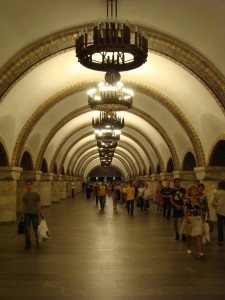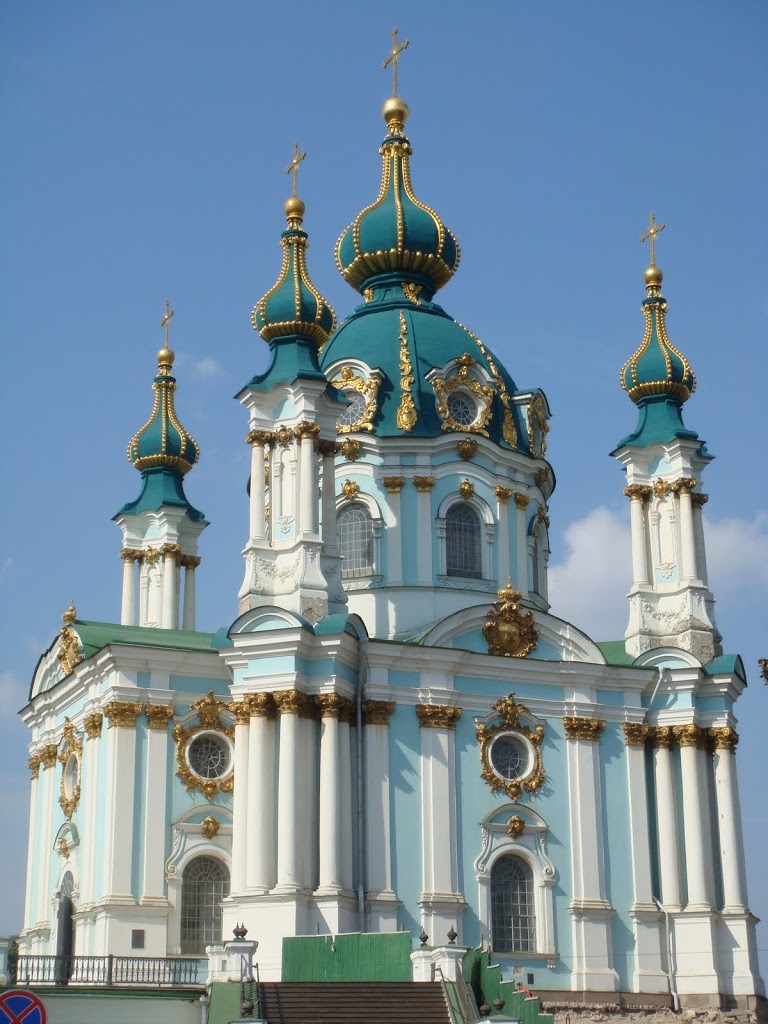
(Originally published in the Greenwich Citizen)
I liked the Ukraine from the moment I arrived. I flew in from Stockholm, where a sandwich in the airport costs $20. In Kiev, that same $20 will cover the forty-five minute taxi ride into the city and a beer once you get there.
I don’t usually take taxis, no matter how cheap they are: if public transit is a tenth of the price, which it usually is, anything else seems indulgent. I also don’t make a habit of getting a beer on arrival, but my plane arrived late and I was scheduled to meet my couchsurfing host, Laure, at a pub at 9pm.
Couchsurfing.org, which I described in greater detail in my previous column, is an online social networking site for travelers of both the armchair and literal variety. It connects budget travelers, or ‘surfers’, with people who are willing to let them sleep on a spare couch, bed, or section of floor for free. Laure is a thirty-something French diplomat who lives in the posh embassy district just north of Kiev’s historic center. When she wasn’t dispensing visas to hopeful emigrants, she took me to embassy parties and tacked me on to a private city tour the embassy had arranged for a visiting French artist. Fortune can be so kind when you go looking for it.
I didn’t know what to expect of Kiev. I certainly wasn’t expecting to find gorgeous white sand beaches in the middle of the city. Their appeal is lessened by the fact that the Chernobyl nuclear meltdown happened a hundred kilometers upstream. Radiation poisoning isn’t really my thing, so I skipped the beach and hit the usual tourist sights. Kiev’s cathedrals are magnificent orthodox confections, with starry domes and darkly glittering icons in their candlelit interiors. The state museums are average, but Ukraine’s oligarchs have a long and faithful history of sharing their acquisitions with the public in sumptuous townhouses: the exhibition of rock star artist Damien Hirst’s skeletons in billionaire Viktor Pinchuk’s icy modernist gallery was only the coolest of the bunch. A few miles down the road, an international modern art festival was intellectually stimulating during the day and a raging new music party every night. On the street, funky folk art rises next to gorgeous eighteenth century mansions. Ubiquitous kiosks sell the two things essential to Slavic well-being: chocolate and vodka. Hundreds of meters under ground, the subway stations drip with mosaics and chandeliers, like medieval grottoes masquerading as bomb shelters.
Kiev’s wealth seemed strange for a country that suffered under Stalin, famine, and the Nazis. I had a hunch I wasn’t getting the full story, so I bought a ticket on a 10-hour train ride west to Lviv, near the border with Poland. Against Laure’s advice, I traveled fourth class, which meant a seat on a bench in an open carriage. I was surprised to find the carriage mostly empty. A few old men hovered near the bathroom – a puzzling choice, as it reeked of stale sewage – and a shirtless man sat on the bench opposite me eating a neon green bell pepper. He said something in Ukrainian, inhaled deeply, and gave me a wry smile.
‘Do you speak English?’ I asked in Russian. The two languages are similar enough that people fluent in either one are able to understand each other. Ukrainian is slightly softer: heard from a distance, it can sound like French. I don’t speak any Ukrainian but have picked up a little Russian.
‘Why yes!’ he said, excitedly. ‘I think. I have learned it but I have never spoken to a born English speaker.’
I told him his English was excellent, and asked what he had been saying in Ukrainian.
‘Oh. I was saying: the toilet, the national smell of Ukraine.’ And he laughed.
Ukrainian humor confuses me. You can’t call it black humor, because it’s depressing rather than ironic. I suppose, when your country was arguably the worst-suffering industrialized nation of the 20th century, a twisted sense of humor comes naturally.
The shirtless man and I spent the rest of the train ride discussing movies, music, and systems of governance. There are so many problems with the Ukrainian state, he said: corruption, flawed educational systems, vanishing social safety net. He still loves his country, though.
‘I hate my country, but we can change.’ The way, he thinks, is to raise a new generation that does not expect the state to take care of everything, like his does. I brought out my US Passport to show him a quote I’d found inspiring, written on the last page of the visas section:
‘Every generation has the obligation to free men’s minds for a look at new worlds… to look out from a higher plateau than the last generation.’ – Ellison S. Onizuka
He smiled again, this time ruefully. ‘You have made me depressed,’ he said. ‘Sometimes I think it will be easy to change and to make good Ukraine’s potential. But we would never have that writing in our passport. I never want to be American, but sometimes I admire you.’
